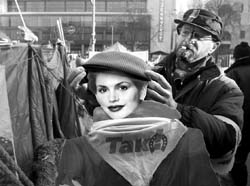Reappraisal of Values
Psychologists on the consequences of the Independence Square rallies
The events of the two post-election weeks could have been predicted as early as in July, but not at all because protest plans were formulated long before the campaign, as some experts believe. According to Mykola Sliusarevsky, director of the Institute of Social and Political Psychology (Academy of Pedagogical Sciences of Ukraine), a powerful protest potential was brewing in society. A survey conducted by the institute in the summer showed that every fifth Ukrainian was ready to personally combat the election fraud. For the first time since independence, civil rights violations (not just back wages and pension issues, as before) was the factor that could propel people into the streets. Compared to the 1990s, far more Ukrainians would not turn a blind eye to corruption and power abuses. Had something like this happened in the 1990s, bloodshed would have been inevitable. But today two factors staved this off: a low level of societal tension and a strong belief in a “radiant future.” Mr. Sliusarevsky thinks the latter in fact served to ease this tension, as the elections were coming on.
Psychologists who gathered last Tuesday to discuss the “orange revolution” concluded that it was hardly possible to avert protests. It is a different matter that Viktor Yushchenko’s followers were more inclined to flood the streets. An Institute of Social and Political Psychology poll showed that 53% (and even 75% on the eve of the runoff) of the “orange electorate” favored a likely protest. At the same time, only 30% of Viktor Yanukovych’s supporters would have opted for this.
Yet the psychological consequences of protest actions could not have been predicted. According to psychologist Dr. Tetiana Pashukova, society was in a pre-panic state.
People had become tired of information and uninterrupted contact with television screens and, hence, lost confidence in tomorrow. Anticipating global changes, they dropped their old attitudes without adopting any new ones. In her opinion, the crowning point was that the glut of political information narrowed the Ukrainians’ vision of the surrounding reality. All this finally intensified emotions and imaginings, which led to rumor mongering on a mass scale.
As for the future, opinions differed in this case. On the one hand, any euphoria (this is exactly the way psychologists characterize the condition of most Ukrainians between November 21 and December 9) invariably gives way to depression. Add to this the great hopes that were pinned on the change of government, and you will see without a shadow of a doubt that coming down to earth will be painful. There will also be weariness, says another psychologist, Dr. Tetiana Tytarenko. On the other hand, psychologists don’t believe in making depressing forecasts. Just recall Independence Square (the Maidan) and its atmosphere of trust and protectiveness, and you will feel that any fear is superfluous.
Speaking of the Maidan, psychologists said they could not recollect a time when respondents were so contactable. This even caused many to smile. Protesters would literally snatch out of their hands questionnaires asking respondents to choose the emotion that best characterized their current mental state. Poll results showed that 50% of 980 respondents had a feeling of unity and pride. While fear was the dominant emotion on the morning of November 22, it vanished after politicians’ public appearances in the evening. Indignation was also gradually on the wane. In the words of psychologist, Dr. Liubov Naidenova, 20% of those polled had this feeling in the first few days and only 10-11% in the second week. The psychologists said it would be wrong to call the Maidan a stressful or exhausting factor. No more than 5% admitted to being fatigued.
Nevertheless there were some stresses and fears. Experts encountered some instances of hysteria and encountered people who said they had to reconsider their entire life. Chronic loss of sleep also affected the protesters. Many tent camp residents admitted that they had stayed awake for more than one night (“What if something happens?”). Psychologists say that what the Maidan protestors feared most was to lose the struggle. “We won’t be able to endure it” was the most widespread response.
Interestingly, the Maidan reflects not only the Ukrainians’ current mood and mental state. It is quite probable that it has triggered a reappraisal of societal values, at least among young people. Whereas in 1998 those aged between 18 and 22 placed emphasis on health, material well-being, friends, family, love, and parental happiness, current polling of the Maidan campers has yielded some unexpected results. The only values that remain from the above list are love and health, ranking first and last, respectively. Among the new priorities are peace, prosperity, and unity for Ukraine, as well as a clear conscience.






